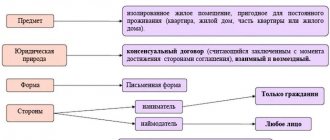Features of this procedure
You can live in a municipal apartment only under a social tenancy agreement.
Before privatization, housing officially belongs to the state and any manipulations with it must be carried out only with the permission of the relevant authorities.
Sometimes in a rented apartment it is necessary to change the responsible tenant, which involves re-issuing documents, including the social tenancy agreement.
The procedure is regulated by law and requires the consent of all family members.
Apartments on the balance sheet of the municipality are transferred to citizens under a social rental agreement.
The document is concluded with the tenant, who was previously called the responsible tenant. Currently there is no such concept in the Housing Code.
In the new version of Law No. 82 of the Housing Code of the Russian Federation, responsibility for the safety of municipal property is imposed on the tenant.
He becomes a citizen:
- adult;
- capable
As a rule, an apartment is issued not to an individual, but to a family, taking into account the interests of all its members. For example, children of different sexes over the age of 9 have the right to a separate room.
And each family member becomes the owner of the apartment, receiving an equal share with everyone else in the event of privatization of housing.
When renting an apartment, a family has the opportunity to conclude several contracts at once, if each person occupies a separate room.
But few take such a step, especially with minor children.
It is much more convenient and faster to conclude one general agreement valid for the entire apartment and all family members. All family members have equal rights to living space.
The employer acquires more responsibilities; he is responsible for the safety of municipal property; in the event of litigation, claims are sent only to the responsible person.
Adding, signing out new tenants, exchanging, selling, renting out and carrying out other manipulations with the apartment is possible only with the consent of all family members.
Family members of the employer include:
- Children.
- Parents.
- Spouse.
- Other relatives recognized as such in court and leading a common household with the employer.
Who can be an employer
The employer can be any adult and capable family member. Who exactly will take responsibility for the living space is decided jointly.
All family members must give their consent to recognize a person as an employer.
If the family cannot reach a common opinion, then the decision is made by the court. It is also possible to conclude a social rental agreement with each person applying for an apartment.
If we think adequately, then the employer most often becomes a spouse with minor children.
It is not profitable to enter into a contract for elderly people - in the event of their death, the documents will have to be reissued, again wasting time.
And it is problematic for an elderly person to go to various authorities when conflict situations arise.
The main condition is that the tenant must be registered in the apartment. A person “from the street,” even if he is a relative of the responsible tenant, cannot become a tenant, nor can he apply for housing.
Rights obtained
The rights of a tenant of a municipal apartment are specified in Article 67 of the Housing Code of the Russian Federation:
| Invite | to reside with other persons who are relatives |
| Hand over | part of the housing for rent |
| Invite for | short-term residence of persons who are not relatives |
| Nominate | requirements for the exchange of housing if it does not suit family members according to certain parameters |
| Nominate to the landlord | requirement to carry out major repairs of a building if it is in disrepair |
Any changes in the apartment, including redevelopment, moving in new residents or renting, are possible only with the consent of all family members, that is, the owners of the apartment.
If their rights are violated, then justice will be restored through the judiciary.
As for the requirements for repair and/or exchange of an apartment, the decision should be general.
The tenant will be required to write an application addressed to the landlord, present a social tenancy agreement and the written consent of all co-owners of the property. Therefore, there is no need to talk about employer privileges.
The only thing that does not require the consent of other members is the registration of the employer’s minor children.
Persons under the age of 18 are registered in an apartment with a parent unconditionally, and no one can contradict this rule.
New responsibilities
The responsibilities of the tenant are specified in the Housing Code and the social tenancy agreement.
They may vary depending on the requirements of the lessor and the regulations applicable to this process.
Main responsibilities include:
| Use housing only for its intended purpose | It is not allowed to organize activities in the apartment that are contrary to the law. If this is noticed by the governing bodies, the social tenancy agreement will cease to be in force, and the tenants will be forcibly evicted (eviction notice) |
| Monitor safety | property, maintain the apartment in proper condition |
| Do not allow violations | rights of neighbors (maintain cleanliness in the area near the apartment, maintain silence during the allotted time, exclude drinking alcoholic beverages and smoking in the entrance, etc.) |
| Be responsible | for causing damage to neighbors' property. For example, one of the family members was bathing in the bathroom, forgot to turn off the tap and flooded the neighbors below. All claims will be directed to the responsible person, that is, the employer. And we will have to look for the true culprit among ourselves |
| Pay on time | public utilities. If two families live in the apartment, then payments may be divided |
| Conduct | apartment renovation |
| Notify the landlord | about possible changes in rental conditions |
The tenant’s responsibilities also include resolving any issues that arise, including claims from neighbors or the landlord.
Therefore, the desire to become a responsible tenant is not justified, since he has no right to evict or discharge people without the consent of other family members.
Also, the tenant does not have the right to claim a larger share of the apartment and the share remaining after abandonment of the apartment or the death of a relative. Each owner has equal rights to living space.
Rights and obligations of a person renting an apartment
Tenant is a citizen of the Russian Federation who has received housing for use under special conditions determined by law. There is a form of a standard social contract. rental of residential premises, which reflects all legal aspects of the relationship between the landlord (state or municipal housing stock) and the tenant (citizen of the Russian Federation).
The relationship between the homeowner and the Tenant is regulated by the following legal documents:
- Housing Code of the Russian Federation (Chapter 8, Section III).
- Civil Code of the Russian Federation (separate norms of Chapter 35).
Rights:
- replace or change allocated housing;
- move in and register temporary and permanent residents at their place of residence;
- sublease the resulting space;
- require major repairs;
- insist on eliminating violations in relation to utilities and common property.
Liabilities:
- maintain the allocated living space in a suitable condition for living;
- carry out routine repairs and preventive maintenance;
- pay housing and utility bills on time;
- report the circumstances leading to the termination or modification of the tenancy agreement.
What is social housing rental – Civil Lawyer
How to change the responsible tenant
Despite almost equal rights and responsibilities for all family members, there must be a responsible tenant.
It is appointed by the decision of all persons applying for an apartment and can be changed for various reasons.
The procedure for re-registering a tenant is a common one and does not require special preparation.
Family members decide who will be the new employer. If disagreements arise, the conflict can be resolved in court.
All adults registered in the apartment can apply for the right to become a responsible tenant.
Due to death
The most common reason for changing an employer is his death. Actions are regulated in Article No. 82 of the Housing Code.
In this case, the social rental agreement does not terminate, unless otherwise stated in the conditions. All family members must agree to the appointment of a new employer.
Many people are interested in the order in which the right to become a tenant arises. She's gone. Since all family members are equal in their rights to the apartment.
Then, for example, after the death of the tenant, a grandson, and not one of the children, may become the responsible tenant.
The applicant must be employed, legally competent and not have a valid criminal record.
In general, the transfer of rights after the death of the employer is carried out without verification of family members, with the exception of court proceedings, when the most responsible family member is selected by the competent authorities.
After the death of the tenant, acting as the only registered tenant in the apartment, the social tenancy agreement loses its force.
Relatives registered elsewhere cannot apply to live in this facility.
Exceptions include minor children living after a divorce with the other parent and having no other living space.
In this case, the official representative of the child can seek in court to award the apartment to the heir.
Although this is rarely practiced, since municipal apartments are not inherited.
From mother to son
A mother can transfer responsibility for an apartment to her son for several reasons:
| Due to the occurrence | incurable serious illness |
| Assuming | imminent death |
| To remove | responsibility from an elderly person |
To change the employer, you will need to contact the management company to renew the social tenancy agreement.
If no other persons live in the apartment, then only the mother’s consent is required.
A son can become an employer only if he is registered and lives at the same address as his mother.
It happens that an employer becomes incapacitated due to illness or injury.
Other apartment owners can represent his interests by presenting a certificate of health of the responsible tenant. It is not necessary to change the employer, although this option is possible.
Children strive to become a responsible tenant after a quarrel with their parents, assuming that they will deregister them if they have other real estate.
But the fears here are in vain. Even the employer does not have the right to discharge family members. With the exception of persons whose whereabouts are unknown. But for this, at least 5 years of searching must pass.
Possible difficulties
Refusal to re-register the contract may occur if:
- not all documents are presented;
- information about the applicant is distorted;
- the legal grounds for concluding the contract have not been confirmed.
Difficulties may also arise if applicants for re-registration are not included in the order or previous contract as relatives of the employer. This situation often happens, for example, with grandchildren. Registration at the place of residence does not automatically give them the right to social rent after the death of the tenant (grandparent).
In this case , you can demand the conclusion of an agreement only by confirming family ties through the court . In order for the contract to be renewed without additional questions, the grandchildren must be included in the order or rental agreement.
Another nuance, by law, a municipal apartment is not inherited after the death of the tenant. But, as elsewhere, there is an exception here - when the tenant was declared incompetent and an official guardian was appointed to him. In this case, the apartment may be inherited.
Most often, children of elderly parents act as guardians , but other cases are possible. Documented proof of guardianship after the death of the tenant serves as the basis for re-registration of the tenancy agreement.
What other possible reasons
A change of employer is also possible for other reasons:
| Eviction from the apartment | employer and deregistration |
| Divorce of spouses | one of whom is listed in the social tenancy agreement as the tenant |
| Arrest | law enforcement agencies |
| The missing | without a trace |
In any of the above cases, documentary evidence of the need to change the employer is required.
The governing bodies will not take their word for it, even if the opinion is unanimous.
Renew or draw up a new contract?
This question may quite naturally arise from the participants. Of course, if it’s just a matter of changing the deadlines, it’s better to draw up an additional agreement . This requires less time for registration.
Another thing is if the participants decided to change several conditions, then it would be more appropriate to conclude a new agreement. From the point of view of tax reporting and other accounting, the best option would be a new document.
Compilation of additional agreement eliminates the following actions :
- Returning the deposit to the tenant, then paying it back.
- Drawing up an apartment acceptance certificate.
Re-registration procedure
To change the employer, you will need to make changes to the social tenancy agreement.
A similar procedure is also necessary when changing the composition of family members living in the apartment.
To change the responsible tenant, he or his family members submit an application to the management company and attach the necessary documents.
Where to go
Having chosen a new tenant by a single decision, you should contact the housing policy department in the region of registration and submit an application, indicating the reason for the need to change the tenant.
It takes several days to consider the request, in rare cases – up to 3 weeks.
The Housing Policy Department makes a decision approving or denying the request.
If the management company does not contradict, then a new social tenancy agreement is drawn up. The presence of all family members is required.
With a new social rental agreement, you should contact the housing maintenance office, where changes are made to your personal account.
This is necessary, first of all, to ensure that utility payments are received in the name of the new tenant.
Where is the best place to go?
Since 2021, the registration of citizens has been carried out by the migration departments of the regional Ministry of Internal Affairs - clause 22 and clause 23 of Order of the Ministry of Internal Affairs dated December 31, 2017 N 984. The Ministry of Internal Affairs accepts applications from citizens directly or through intermediaries in the form of MFCs, passport offices or State Services - clause. 91 Order of the Ministry of Internal Affairs N 984 and Decree of the Government of the Russian Federation of July 17, 1995 N 713.
The instructions and list of documents do not differ depending on the organization you want to contact. So first read the pros and cons of each:
- MFC "My Documents".
Pros - 1) More often the procedure is faster. By law, the maximum period is 3 working days from the date of application. MFCs send documents to the Ministry of Internal Affairs electronically through the system of interdepartmental interaction (SMEV) - clause 35 of Order of the Ministry of Internal Affairs N 984. 3) Employees are more willing to help fill out papers. 3) You can make an appointment with them in advance by phone or through the website. 4) Their service is free.Disadvantages - 1) Not all MFCs provide registration services. First, call your local MFC and check this out. Addresses and telephone numbers are always available on the Internet. 2) Sometimes you have to wait in line, because MFCs also provide other services.
- Passport office of the Management Company (housing department, housing office, homeowners' association, etc.).
Only one plus - usually there are no queues. Cons: 1) The registration period is longer - maximum 6 days. Because they are not connected to the system of interdepartmental interaction with the Ministry of Internal Affairs, therefore documents are transferred in paper form - clause 32 of Order of the Ministry of Internal Affairs N 984. 2) Some passport officers charge about 30-100 rubles for receiving and transmitting documents. In most management companies, this service is already included in the cost of home maintenance, so they don’t ask you to pay anything. The registration procedure itself is always free - clause 62 of Order of the Ministry of Internal Affairs N 984. - Regional Ministry of Internal Affairs.
Pros - 1) You can make an appointment or submit an application through State Services. 2) They will register the next day at most (clause 36 of Order of the Ministry of Internal Affairs N 984), but here there is a big nuance.Cons: 1) You can get an appointment for at least 8 days. Usually 10 - 12. As a result, you will have to wait longer than when contacting the MFC or passport office. 2) According to paragraph 91 of Order of the Ministry of Internal Affairs N 984, you are allowed to come without an appointment or make an appointment by phone, but it is easy to stumble upon long queues. Moreover, more of those who signed up in advance. And they rarely answer the phone. 3) They are reluctant to provide advice on filling out documents.
Now you can read the instructions themselves. About applying to the MFC/passport office is described below, and about the Ministry of Internal Affairs here is a link.
Changes
Sometimes there may be a need to change other points of the main document. What to do in this case?
Who has the right to contribute?
You can change at least something written in the contract only by agreement . Any of the participants can become the initiator. No one can single-handedly rewrite the established conditions.
Grounds and reasons
Attention! The basis may be the desire of one of the parties to change the previous conditions, if the consent of the other party is obtained.
Most often, such changes occur due to the desire to reduce or increase the rent. Or, for example, the tenant wants to move in a third party, which was prohibited under the previous agreement.
The reasons can be completely different. If mutual agreement is reached, there are no obstacles to its implementation. Sometimes life itself reveals unaccounted for moments . For example, if a situation occurred due to the fault of the tenant, the responsibility for which is not specified in the contract, then the landlord may want to avoid getting into it again.
How to apply?
In this case, an additional agreement is also drawn up, only it will indicate not the extension, but the desired changes. The registration procedure is generally the same as for renewal.
The main thing is to describe the new points clearly and without contradictions, including the old ones with a note to consider them invalid. Indicate that other conditions remain unchanged.
Is registration required?
If the validity period of the main document has not changed during registration, then registration is not required . Agreements to a long-term housing lease agreement in which the validity period of the main document has been changed are subject to registration.
The legal relationship between the landlord and the tenant has a clear and transparent structure. It is unlikely that you will get confused in them if a competent agreement is drawn up. But in any case, any relationship, be it legal or human, requires an agreement. Know how to negotiate, read documents carefully before signing and defend your legal rights!
If you find an error, please select a piece of text and press Ctrl+Enter.







